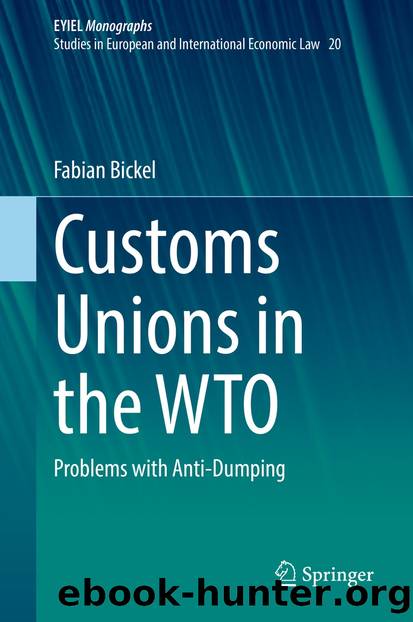Customs Unions in the WTO by Fabian Bickel

Author:Fabian Bickel
Language: eng
Format: epub
ISBN: 9783030863128
Publisher: Springer International Publishing
5.1 What Is Responsibility and What Is Attribution?
This section will define responsibility and attribution in the abstract (under Sect. 5.1.1) before considering what the definitions mean in the context of anti-dumping (under Sect. 5.1.2) and laying down the practical relevance of the concepts (under Sect. 5.1.3).
5.1.1 Definitions in International Law
The ILC has codified international customary law on responsibility and attribution in the ARIO and ARSIWA. What responsibility is, is best understood through the requirements following which it arises and the consequences that stem from it. Accordingly, responsibility for an act arises if there is an internationally wrongful act of a state or an international organization.4 There is an internationally wrongful act of a state or an international organization if an act that constitutes a breach of an international obligation is attributable to the state or the international organization.5 If responsibility arises, the state or the international organization is under a duty to (a) cease the act, (b) to offer appropriate assurance of non-repetition, if circumstances so require6 and to potentially make full reparation of injury caused.7
This also broadly corresponds with traditional definitions of responsibility.8 Thus, responsibility is concerned with the identification of the proper respondent which is different from the question whether that respondent can effectively remedy the alleged breach. A state or an international organization can be responsible even if that actor cannot provide an effective remedy.9
For responsibility to arise, two requirements must be met: (1) an act must violate an international obligation and (2) that act must be attributable to a state or an international organization.
Responsibility requires a breach of an international obligation. The question whether a state or an international organization is bound by an international obligation is therefore a condition for responsibility to arise and not synonymous with responsibility.10 An international obligation arises through conventions or treaties, international customary law and general principles of law.11
Attribution concerns the relationship of a certain action or omission with a state or an international organization such as if it exists, that act or omission can be attached to the state or international organization.12 It is thereby distinct from the question whether the actor acted within its competences.13 Whereas rules of competences regulate internally who is allowed to act, attribution considers factually whether an act can be attached to an entity.14 Attribution is one of the conditions of responsibility, but attribution can also serve as an international obligation independently of responsibility.15
Download
This site does not store any files on its server. We only index and link to content provided by other sites. Please contact the content providers to delete copyright contents if any and email us, we'll remove relevant links or contents immediately.
Day by Elie Wiesel(2237)
The Age of Genius by A. C. Grayling(2169)
Gideon's Spies: The Secret History of the Mossad by Gordon Thomas(1944)
The Gulag Archipelago (Vintage Classics) by Aleksandr Solzhenitsyn(1720)
FATWA: Hunted in America by Pamela Geller(1718)
Columbine by Dave Cullen(1492)
Examples & Explanations: Administrative Law by William F. Funk & Richard H. Seamon(1321)
The Rule of Law by Bingham Tom(1315)
Men Explain Things to Me by Rebecca Solnit(1310)
Anatomy of Injustice by Raymond Bonner(1265)
Three Cups of Tea by Greg Mortenson(1254)
ADHD on Trial by Michael Gordon(1235)
That Every Man Be Armed by Stephen P. Halbrook(1234)
Gideon's Spies by Gordon Thomas(1207)
Palestinian Walks by Raja Shehadeh(1138)
The Source by James A. Michener(1128)
Fast Times in Palestine by Pamela Olson(1110)
Nothing to Envy by Barbara Demick(1038)
Constitutional Theory by Carl Schmitt(1031)
